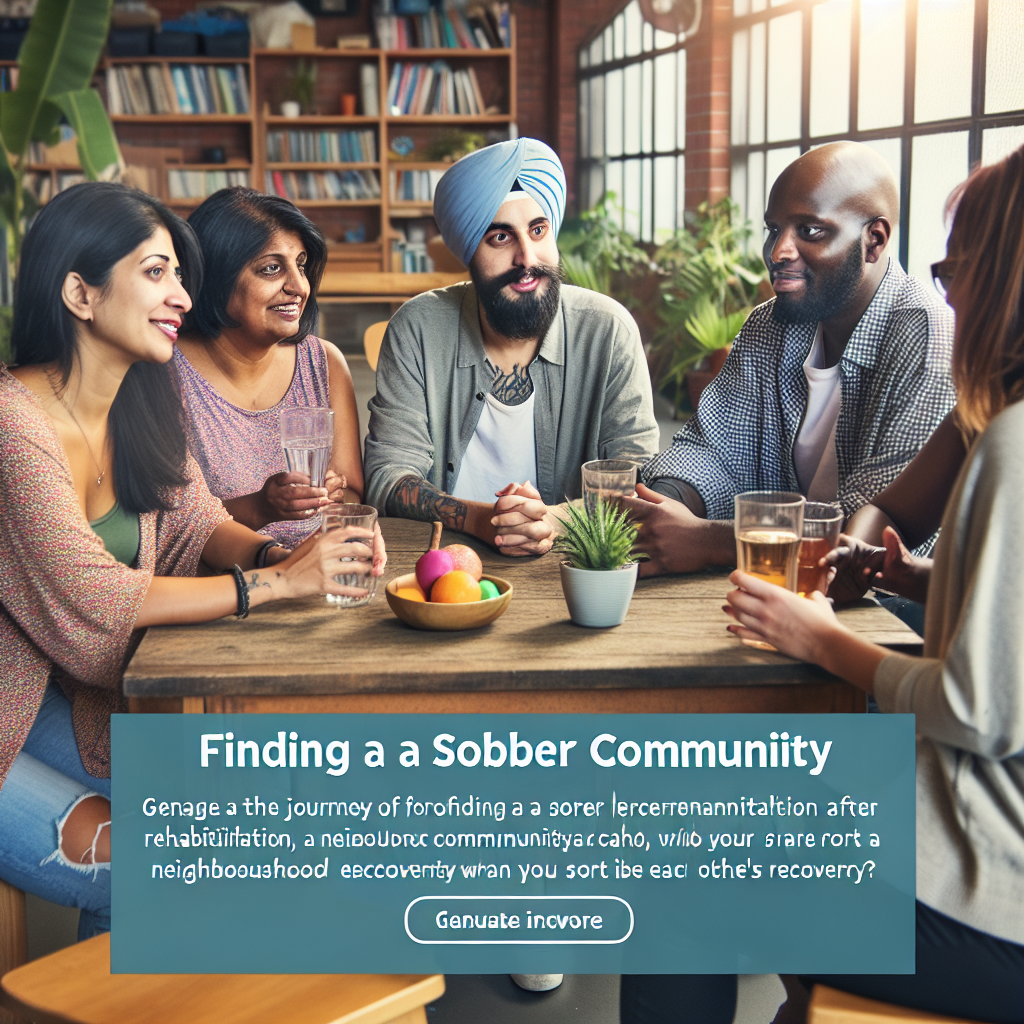-
Table of Contents

“Reconnect, Rebuild, Rediscover: Your Guide to Finding a Sober Community Post-Rehab”
Introduction
Finding a sober community post-rehab is a crucial step in maintaining long-term sobriety and fostering a supportive network. After completing a rehabilitation program, individuals often face the challenge of reintegrating into daily life while avoiding triggers and temptations that could lead to relapse. A sober community provides a safe and understanding environment where individuals can share experiences, gain encouragement, and build meaningful relationships with others who are committed to sobriety. This guide will explore various strategies and resources to help you find and connect with a sober community, ensuring you have the support needed to continue your recovery journey.
Steps To Identify And Join A Supportive Sober Community After Rehab
Finding a supportive sober community post-rehab is a crucial step in maintaining long-term sobriety. The journey to recovery doesn’t end when you leave a rehabilitation center; in fact, it is just the beginning. To ensure a successful transition, it is essential to identify and join a community that understands your struggles and supports your commitment to a sober lifestyle. The first step in this process is to recognize the importance of a sober community. Surrounding yourself with individuals who share similar experiences and goals can provide a sense of belonging and reduce feelings of isolation. This network can offer emotional support, practical advice, and encouragement, which are vital components in sustaining sobriety.
One effective way to find a sober community is to attend local support group meetings. Organizations such as Alcoholics Anonymous (AA) and Narcotics Anonymous (NA) have chapters in many cities and towns. These groups provide a structured environment where you can share your experiences and listen to others who are on the same path. The regular meetings create a routine, which can be particularly beneficial in the early stages of recovery. Additionally, these groups often have social events and activities that can help you build relationships outside of the formal meetings.
Another avenue to explore is online support groups and forums. The digital age has made it easier than ever to connect with people from all over the world who are also in recovery. Websites and social media platforms offer various groups and communities where you can participate in discussions, share your journey, and seek advice. These online communities can be especially helpful if you live in a remote area or have a busy schedule that makes attending in-person meetings challenging. Moreover, the anonymity of online interactions can provide a level of comfort for those who may feel apprehensive about sharing their struggles face-to-face.
In addition to support groups, consider engaging in sober activities and hobbies. Many communities have organizations that offer sober events, such as sports leagues, art classes, and book clubs. Participating in these activities can help you develop new interests and friendships that do not revolve around substance use. It also provides a healthy outlet for stress and a way to fill the time that might otherwise be spent in environments that could trigger a relapse.
Volunteering is another excellent way to integrate into a sober community. Giving back to others can be incredibly fulfilling and can help shift your focus away from your own challenges. Many organizations welcome volunteers who are in recovery, and this can be a great way to meet like-minded individuals who are also committed to living a sober life. The sense of purpose and connection that comes from helping others can be a powerful motivator in your own recovery journey.
Lastly, don’t underestimate the value of professional support. Therapists and counselors who specialize in addiction recovery can provide guidance and resources to help you find and join a sober community. They can also offer individual or group therapy sessions that complement the support you receive from your peers.
In conclusion, finding a supportive sober community post-rehab involves a combination of attending support group meetings, engaging in sober activities, participating in online forums, volunteering, and seeking professional guidance. By taking these steps, you can build a network of support that will help you navigate the challenges of recovery and maintain your commitment to a sober lifestyle. Remember, you are not alone on this journey, and with the right community, you can achieve lasting sobriety.
Effective Strategies For Finding A Sober Community Post-Rehabilitation
Finding a sober community post-rehabilitation is a crucial step in maintaining long-term sobriety and fostering a supportive environment for personal growth. After completing a rehabilitation program, the transition back into everyday life can be challenging. However, by employing effective strategies, individuals can find a sober community that provides the encouragement and accountability necessary for sustained recovery.
One of the most effective ways to find a sober community is by attending local support group meetings. Organizations such as Alcoholics Anonymous (AA) and Narcotics Anonymous (NA) offer regular meetings where individuals can share their experiences and receive support from others who understand the journey of recovery. These meetings not only provide a sense of belonging but also offer a structured environment where individuals can learn from the experiences of others. By consistently attending these meetings, individuals can build strong connections and develop a network of supportive peers.
In addition to traditional support groups, many communities offer specialized recovery programs that cater to specific interests or demographics. For instance, there are recovery groups for young adults, LGBTQ+ individuals, and veterans. These specialized groups can provide a more tailored support system, allowing individuals to connect with others who share similar life experiences and challenges. By seeking out these niche communities, individuals can find a sense of camaraderie and understanding that may be more difficult to achieve in broader support groups.
Another effective strategy for finding a sober community is to engage in sober activities and events. Many communities host sober social events, such as movie nights, sports leagues, and art classes, which provide opportunities for individuals to connect with others in a substance-free environment. Participating in these activities not only helps to build a sober social network but also allows individuals to discover new hobbies and interests that can enrich their lives. By staying active and involved in these events, individuals can create a fulfilling and enjoyable sober lifestyle.
Volunteering is another powerful way to find a sober community. Many organizations, such as homeless shelters, food banks, and animal rescues, rely on volunteers to support their operations. By dedicating time to helping others, individuals can find a sense of purpose and fulfillment that can be incredibly beneficial in maintaining sobriety. Additionally, volunteering often brings together like-minded individuals who are also committed to making a positive impact, providing an excellent opportunity to build meaningful connections.
Online communities can also play a significant role in finding a sober community post-rehabilitation. There are numerous online forums, social media groups, and virtual support meetings that cater to individuals in recovery. These platforms offer a convenient way to connect with others, share experiences, and seek advice from the comfort of one’s home. While online interactions should not replace in-person connections, they can be a valuable supplement to an individual’s support network.
Lastly, it is essential to communicate openly with friends and family about the need for a sober community. Loved ones can provide invaluable support and may even help identify local resources or introduce individuals to others in recovery. By fostering open and honest communication, individuals can strengthen their relationships and create a supportive environment that encourages sobriety.
In conclusion, finding a sober community post-rehabilitation is a multifaceted process that requires effort and commitment. By attending support group meetings, engaging in sober activities, volunteering, exploring online communities, and communicating with loved ones, individuals can build a robust support network that fosters long-term sobriety. Embracing these strategies not only aids in maintaining sobriety but also enriches one’s life with meaningful connections and a sense of purpose.
Q&A
1. **Question:** What are some online resources to find a sober community post-rehab?
**Answer:** Online resources to find a sober community post-rehab include websites like Sober Grid, In The Rooms, and Reddit’s r/stopdrinking community.
2. **Question:** How can local support groups help in finding a sober community post-rehab?
**Answer:** Local support groups such as Alcoholics Anonymous (AA), Narcotics Anonymous (NA), and SMART Recovery provide regular meetings, peer support, and a sense of community for individuals seeking sobriety post-rehab.
Conclusion
Finding a sober community post-rehab involves several key steps: attending local support group meetings such as Alcoholics Anonymous (AA) or Narcotics Anonymous (NA), engaging in sober activities and hobbies, utilizing online resources and forums dedicated to sobriety, seeking out sober living homes, and building a network of supportive friends and family. By actively participating in these communities and resources, individuals can create a strong support system that fosters long-term sobriety and personal growth.



